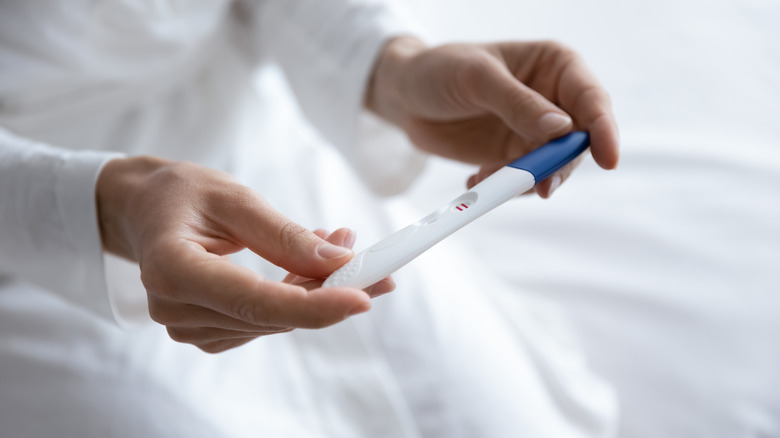Is Implantation Bleeding Normal In The Early Stages Of Pregnancy?
In the early days of a pregnancy, it can be hard to know if what you're experiencing is normal. Every twinge or ache can leave you running to the baby books, and any kind of bleeding can be particularly concerning. But is implantation bleeding, which often happens before you even know you're pregnant, normal?
When a fertilized egg makes its way to the uterus, it attaches itself to the uterine lining (via American Pregnancy Association). This can cause a small amount of bleeding when some of the blood vessels break down, known as implantation bleeding. It usually happens around 10-14 days after conception, which means it's often the first indicator of pregnancy. However, since this usually coincides with the timing of a menstrual period, some women don't realize it's implantation bleeding and don't know they're pregnant. This type of bleeding differs from a period, though. It's typically only a small amount of light pink or dark brown discharge, only lasts up to three days, and shouldn't include any clotting.
How to tell what's normal
Implantation bleeding is a normal sign of early pregnancy, occurring in up to 25% of pregnancies (via Healthline). While not all women will experience it, it's not usually a cause for concern. Other symptoms of early pregnancy that are similar to those of a menstrual period include light cramping, mood swings, headaches, back pain, and tender breasts. If you're not sure if bleeding is due to a period or implantation, the American Pregnancy Association recommends waiting three days after the bleeding stops and then taking a pregnancy test.
However, if you're experiencing any bleeding beyond the point of a missed period, it may be an indicator that there's an issue with the pregnancy, notes the American Pregnancy Association. If you're experiencing extended bleeding further into your pregnancy, it may be a sign of miscarriage. Throughout pregnancy, you should always let your doctor know about any spotting or bleeding. In the second and third semesters, make sure to let your doctor know as soon as possible.
If you notice heavy bleeding at any point in your pregnancy, contact your doctor immediately. You may even want to seek emergency care. If your bleeding is accompanied by nausea or vomiting, dizziness, or abdominal pain (particularly if it is one-sided) then you should also consult your doctor immediately, as you might be experiencing an ectopic pregnancy.


